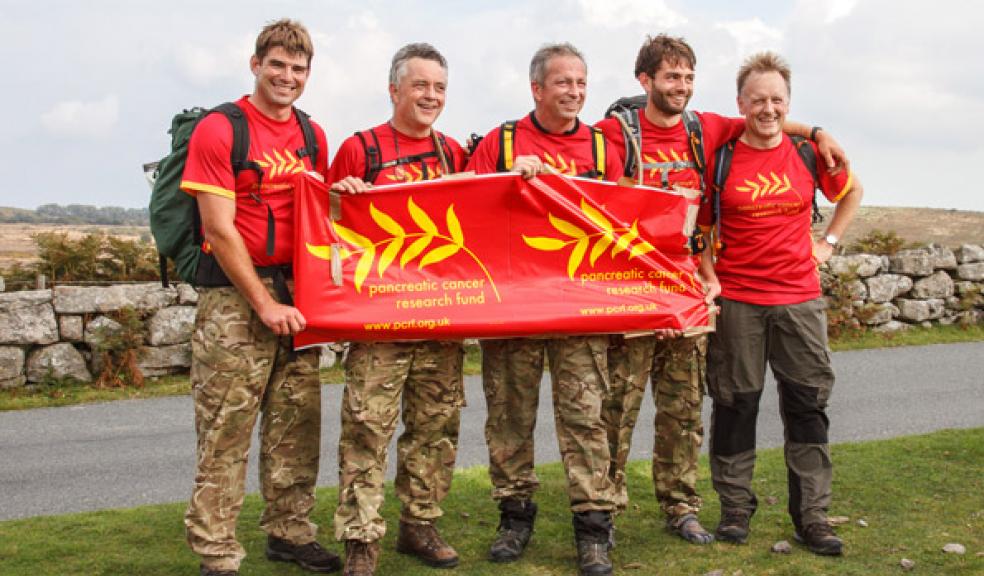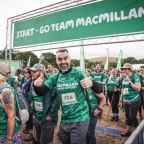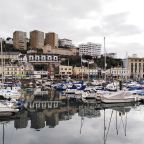
Doctor diagnosed with cancer re-runs commando challenge to raise over £20,000
A consultant anaesthetist from Derriford Hospital in Plymouth, who was diagnosed with pancreatic cancer last year, has re-run the commando test that he took on nearly 25 years ago.
On Monday 29 September, David Birt, from Tavistock, accompanied by his son, Harry (20) and three friends with whom he has deployed on military operations - Andy Burgess, Anaesthetist, Royal Navy, Tony Cramp, ex-Fleet Air Arm helicopter pilot and Martin Allison, Sergeant, Royal Marines, took on the All Arms Commando Course to raise funds for the Pancreatic Cancer Research Fund.
David’s aim was to re-run the final Commando Test – the ‘30-miler’ – in less than 12 hours, which is no mean feat for a 49 year old – but doubly challenging as he has to cope with chemotherapy treatment every fortnight. However, not only did David and his team complete the challenge, they did so in a very respectable time of eight hours, 20 minutes.
The five-strong team were supported along the route by their wives and friends. Here David’s wife, Sara, talks about what happened on the day:
“We drove up to the start of the 30 miler route through the early morning mist, arriving at Okehampton camp to find several well-wishers waiting to see the team off on their epic journey. This set the tone for the rest of the day with more and more people joining the support team, peering through binoculars to catch a first glimpse of the 5 of them.
“Armed with stoves, kettles and a splendid collection of sausages, bacon butties, cakes and biscuits we were barely setting up camp when the runners appeared over the clapper bridge at Postbridge. They had covered 12 miles in three hours 30 minutes. This was going to be fast, with David barely out of breath and smiling broadly… any doubts that he was fit enough to complete this, banished.
“Refuelled, they disappeared up the road towards Bellever, accompanied by various dogs. We decamped to Bennett's Cross, preparing for their next stop. They duly arrived one hour 20 minutes later having covered a further six miles. Plied with pasties, they set off towards Hound Tor, regretting the carbohydrate load as they toiled up the first hill.
“Hound Tor, 7 miles on, was an opportunity for fresh socks, a change of clothes and a cup of tea. They were all looking a little sweaty by this stage, some with a glassy looks to their eyes. The end was only five miles away, but this the most gruelling section. They appeared running, strongly as a tight unit, led by David and his son Harry, shoulder to shoulder, finishing at 14.55. There was not a dry eye amongst the many spectators.
“This challenge has raised a tremendous amount - to date over £20,000 with the Gift Aid. What has been so moving has been the outpouring of goodwill, which we have seen. Comments on the Just Giving page show the very deep affection and respect which people have for David. This is not from just a few friends, but from literally hundreds of people.
“This was a challenge which took real courage to undertake, determination to see through, and unselfishness to even think of. But it has been the Cheerfulness which has shone the most brightly throughout - David’s attitude to life which makes the world a better place for everyone who knows him.
“Thank you all for your support. It has been overwhelming.”
There is still time to donate to the team – visit David’s fundraising page https://www.justgiving.com/Birtie
David’s Diagnosis
Diagnosed with advanced aggressive pancreatic cancer in November 2013, David initially experienced some back pain over several weeks but being very active put it down to wear and tear. However, he then developed persistent central abdominal pain which increased in intensity of a period of two weeks, prompting him to seek medical help. Investigations revealed a tumour on his pancreas and secondary tumours in lymph nodes, lungs and neck. As the cancer had already spread, surgery (currently the only ‘cure’) was not an option.
David was started on chemotherapy straight away, administered in two-weekly cycles. He has responded well, with some tumours shrinking and others no longer visible on recent scans.
As of last month, David was on his 19th cycle of chemotherapy. His treatment will continue until it stops being of benefit.
For now, he says: “I feel well. I’m pain free, active much of the time. My remaining symptoms are due to the treatment rather than the illness; they are grim for a few days, but settle, and we make the very best of the times in between.
“I’m now being treated and looked after by colleagues at the hospital where I’ve worked for 15 years. I know I’m in good hands."
"I’ve been in several situations on active service where I have had to face the real possibility of death. Once you come to terms with that, you’re less afraid. Anxiety makes no difference to the outcome, it will just ruin the time remaining - it's the same situation with this disease. I intend to make the most of every day left to me.”
Pancreatic cancer has the worst survival rate of any common cancer. Only 3% of those diagnosed will live for five years or more. The survival rate has not improved in the past 40 years and new treatments are desperately needed. There is no early diagnostic test, symptoms are often mistaken for more benign conditions and these generally only appear when the cancer has already spread. Because of this, most people (85-90%) are diagnosed too late for surgery, which is currently the only treatment offering a chance of survival. With its 97% mortality rate, an early diagnostic test, and new treatments to tackle this cancer are desperately needed. This is what the Pancreatic Cancer Research Fund is exclusively focused on achieving.
In the UK, around 8,800 people are diagnosed with pancreatic cancer every year.
“Making a difference to this cancer will only be achieved through more research, that’s why I chose to raise money for PCRF.”
David is raising money for the Pancreatic Cancer Research Fund (www.pcrf.org.uk ). This charity currently funds 27 world leading research projects across UK universities worth some £4 million to develop an early diagnostic test and new therapies to tackle this disease. David said: “Making a difference to this cancer will only be achieved through more research, that’s why I chose to raise money for PCRF."
PCRF Founder and Chief Executive, Maggie Blanks, said: “I don’t think anyone who has spoken to David is in any doubt whatsoever that he and his team will complete this tough challenge. His determination and sense of humour is inspirational and the money David raises will be put to great use, funding the very best UK research into this disease. We are extremely grateful for his support.”











